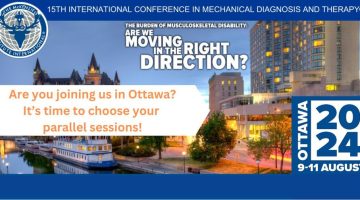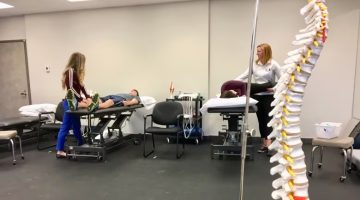Physiotherapy
Physiotherapy is:
‘Physical Treatment’, based on a detailed assessment to determine the cause of the problem. This is followed (if appropriate) with a careful mechanical evaluation, from which a plan of action will be made with the client’s permission and complete involvement.
Treatment is likely to include mechanical techniques if necessary; a self-treatment exercise home plan to allow the client to continue the mechanical correction at home; electrical modalities if indicated and education to help to correct and prevent recurrence of the problem.
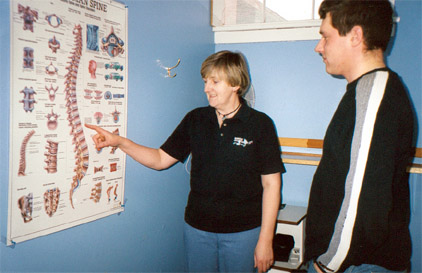
Physiotherapy prevents or lessens some of the physical problems that are associated with injury, disease, disability, birth defects or long periods of inactivity. Physiotherapy is concerned with both rehabilitation and prevention. It is used whenever mobility, independence and physical fitness are important. The terms “physiotherapy” and “physical therapy” mean the same thing.
Physiotherapy can help you:
- become stronger and more flexible
- increase your freedom of movement and mobility
- breathe easier
- reduce pain
- stay active
- prevent injury
…so that you can return to work, leisure or home activities.
Physiotherapists work in:
- private clinics
- hospitals
- rehabilitation centers
- long-term care facilities
- homecare programs
- schools
- child development centers
- industry
- recreation centers
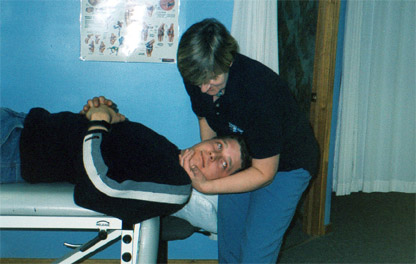
Physiotherapists are…
Physiotherapists are trained professionals who work in partnership with you (and your family, if necessary). Every practicing physiotherapist in the Maritime Provinces has graduated from an accredited university degree program (or its equivalent) in physiotherapy. Physiotherapists work with people of all ages. Some are experts in different areas, such as:
- back and neck care
- ergonomics*
- neurology
- repetitive strain injuries
- sports physiotherapy
- heart and lung care
- mobilization or manipulations
- orthopedics
- therapeutic exercise
- postural training
* Ergonomics means adapting the workplace or home to the needs of the individual.
Physiotherapists often work in teams
with other health professionals to help you meet your health care needs.

Your first appointment
Your first appointment is all about assessment, physical diagnosis and treatment.
Assessment
The physiotherapist will ask you about your problem(s) and how it occurred, your current symptoms, your health history and the physical requirements of your job and leisure activities. She or he will then carefully look at, touch and test the affected area(s).
Physical Diagnosis
Your physiotherapist will explain the mechanical diagnosis to you; what is means and how to deal with it. Then the two of you will set the goals of your treatment together. Be sure you understand everything the physiotherapist is saying. In addition, ask some questions of your own.
After physical diagnosis, your physiotherapist will start your treatment. It should be tailor-made to meet your special needs. Consent (usually verbal is sufficient) for treatment is required before the physiotherapist can proceed. If you don’t understand something, or if the procedure causes any discomfort, tell your physiotherapist.
What results can I expect?
How long before I see these results?
What can I do on my own to help the process?
- You can expect complete honesty and involvement in all discussion and treatment planning. This could include being told that physiotherapy cannot help and in this case the physiotherapist will report to the medical practitioner (as directed by the client) and may make other referral recommendations.
- In most cases you can expect to make progress withing the first week for a mechanical problem, and within three weeks for an inflammatory problem, but your commitment to exercise and following advice is critical for a good result
- You are the key player in your recovery. The physiotherapist of clinician will assist; teach and guide you and it will be very important for you to be involved and follow the exercise plan and advice. Only you can ultimately make to difference. You are with you body 24 x 7 ! You should gradually become in control and be able to correct a problem / pain when it hits at 3 am.
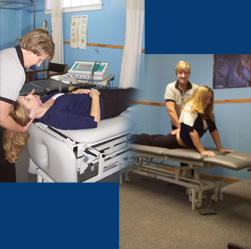
Treatment
Treatment will be based on the assessment clinical findings and plan discussed with the client. Your physiotherapist has many treatments to choose from. He or she will select the best ones for your particular needs. Your physiotherapist will explain a treatment to you before doing it. If there’s anything you don’t understand, please ask. The treatment may be simple and straightforward or very complex, depending on your needs. You will always be actively involved in your treatment. No treatment should cause you distress, anxiety or severe pain. YOU are in charge.
Paying For Treatment
The cost of your physiotherapy treatment may be partly or completely covered by one or more of the following:
- W.C.B. (Worker’s Compensation Board). We are approved with the N.S. and N.B. boards but out of province boards are often available for funding also, with pre-approval.
- Department of Veterans Affairs, Government of Canada
- Private health insurance coverage
- Third party payers (i.e. motor vehicle insurance)
Check with your Insurance Co. yourself as they will not disclose personal information to our staff but we will offer assistance as best we can..
Access
Everyone has access to physiotherapy in a variety of settings. Each province has legislation/regulations that determine if you need a physician’s referral. In Nova Scotia you have direct access to physiotherapy but for some insurance funding you may require a doctor’s referral.
You have the freedom to choose your physiotherapist. Friends, family, co-workers, your doctor and other health care providers can advise you on your choice of licensed health care professional.
Making It Work
Your body is not like a car – it can’t be dropped off with the physiotherapist and picked up once its fixed. Good physiotherapy is a partnership between you and your physiotherapist, and the partnership needs your active involvement. There are few things you can do to get the most out of your physiotherapy visits:
- During treatments give your physiotherapist feedback about how it feels. Always discuss your progress with your physiotherapist.
- Speak up about anything you are concerned about or don’t understand. Physiotherapists in the Maritime Provinces are obligated to explain treatments and procedures to your satisfaction – but they can’t read your minds.
- Make a note if anything unusual happens between visits. Most people don’t write these things down and forget before they see their physiotherapist again.
Your physiotherapist may instruct you in some exercises at the appropriate time. Be sure to go over them carefully so you understand what to do and how often to do it. These will usually be provided on a personalized exercise sheet
You’re in good hands
Physiotherapists have been putting Canadians back in motion for over seventy-five years.
The quality of physiotherapy treatment is regulated by the Provincial Licensing bodies. They set and enforce educational and practice standards to protect the public interest. Every physiotherapist must be licensed by their Provincial Licensing Body.
The majority of physiotherapists in the Maritime Provinces are members of the Canadian Physiotherapy Association and its Provincial Branches. Their mandate is to advance the delivery of physiotherapy services by promoting excellence in education, research, and clinical practice.
Canadian Physiotherapy Association
N.S. Branch
Suite 740
5991 Spring Garden Rd.
Halifax, NS
B3H 1Y6

